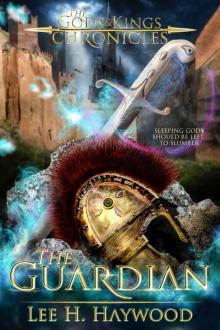- Home
- Lee H. Haywood
Fractured Throne Box Set 1 Page 2
Fractured Throne Box Set 1 Read online
Page 2
CHAPTER
I
IMEL KATAN
In a time of plague, men chose war. The irony of it all wasn’t lost on Emethius as he sat atop his horse eyeing the enemy fortress he intended to capture. He wished the slaughter would stop, but he knew it wouldn’t, at least not until the rebels were beaten into submission.
Dead grass shifted about the ankles of his horse, creating a ceaseless rustle that frayed Emethius’s nerves. The wind tore across the land without end. It came cold and steady, causing Emethius’s cheeks to burn as if they were on fire. Despite the chill, his clothes were sodden with sweat. Fear and exhaustion had a way of doing that to a soldier.
He longed to sit beside one of the countless sputtering fires that glowed across the military camp. But tonight that was not his duty. He had been summoned to advise the praetor, and so he patiently waited to be called upon.
For the hundredth time that evening Praetor Maxentius raised a spyglass to his eye, sighting the ominous tower that appeared only as a dim outline against the night sky. He followed a pair of men walking the parapet with the lens. “Traitors are a step below vermin, Captain Emethius,” said Maxentius, repeating a sentiment he had expressed so often it might as well have been the slogan for the campaign. “It is the supreme sin. I feel like I need to bathe that blasted tower in fire. It’s the only way I can purge the land of this rebel taint.”
“You would not be the first to try to burn Imel Katan to the ground,” said Emethius, shifting uncomfortably in his saddle. He had sat astride a horse for so long his ass felt like a single giant bruise. He couldn’t think of the last time he had disrobed. His undergarments were worn threadbare, and the coarse binding straps of his armor had rubbed the flesh along his shoulders and ribs raw. He had more open sores than he cared to count. He stunk of horse, iron, and blood. “Countless others have tried to burn Imel Katan to the ground; all have failed. They say the fortress was built by witchcraft. You cannot destroy evil with evil, or so it is said.”
Praetor Maxentius flared his brows at the suggestion. He was not accustomed to anyone telling him he was incorrect. “I’ll see that it burns when this butcher’s work is through,” growled the praetor. “Even if I need to use an entire forest as kindling.” He smacked the looking glass against Emethius’s chest.
Emethius stifled his opinion; sometimes the praetor wanted words, and sometimes he wanted silence. Emethius hastily collected the spyglass from the praetor’s outstretched hand and returned the delicate instrument to its container in his saddlebag.
Emethius’s horse stomped his feet in response. The beast, like everyone else, was tired of being idle. They had already delayed for three crucial days, giving the enemy ample time to fortify the ruins of Imel Katan. The chime of rebel hammers had been ringing nearly non-stop since they arrived. The gods only knew what traps the rebels had lying in store for them. The longer Praetor Maxentius delayed the assault, the more nervous everyone seemed to get.
“My men are prepared for the advance, praetor,” called a rider that approached out of the night. The rider drove his horse between Maxentius and Emethius, edging Emethius aside. The man was Saterius, Maxentius’s son-in-law. He looked like a beast, wearing a wolf skin cloak over his armor. His face was a dark mask, painted black in preparation for the coming battle. “We’ve soaked the ladders and battering rams in water. The men’s armor has been dulled with mud.”
Maxentius nodded curtly.
“A frontal assault is folly, praetor,” said Emethius, knowing full well Saterius’s intent. They had already debated the matter half-a-dozen times.
“Wise men know when their advice is needed. Seldom do they speak otherwise,” snapped Saterius.
“A wise man, eh?” Emethius scowled at Saterius. “A wise man does not throw the lives of his men away. The praetor has ordered me to his side so that I might advise him.” He turned back to Maxentius and repeated his opinion even louder. “The frontal assault is a mistake.”
“I heard you the first time,” said Maxentius, his voice a low growl. His eyes never strayed from the tower.
Emethius readjusted his leather cuirass, wishing he could disappear through the neck hole. Saterius smirked like a child who had just bested his sibling.
Saterius was a hammer, the kind of blunt tool every commander needed in their arsenal. Go there, kill that. Saterius would never question the order, nor would he disappoint. But this operation required precision. Emethius could only pray that Maxentius would listen to wisdom before it was too late — they had already lost too many men.
The loyalist army had pursued the rebels across the Billowing Flats, engaging them in battle seven times in as many days. When loyalist forces stormed the rebel encampment at the close of the last battle, most thought the war was finally won. But Herald Carrick, the rebel commander, had somehow managed to elude capture. He led the tattered remnants of his army to the abandoned fortress of Imel Katan.
The fortress was built upon a peninsula that reached out toward the center of a lake that was shrouded in ice. With ice-choked water on three sides and the loyalist army blocking the peninsula’s neck, there was nowhere else for the rebels to go; this would be their final stand.
“The herald is watching,” said Saterius with a nod.
For the first time in a dozen generations the tower was occupied. The stone portals of its balconies glowed like the eyes of a giant. A gaunt figure wearing a cape and plumed helm stood silhouetted against the highest portal.
“He appears more frail than I remember,” said Emethius.
“War has a way of thinning a man,” replied Praetor Maxentius.
“I imagine he’ll be a few pounds lighter when I take off his head.” Saterius laughed at his own joke. No one else did.
Herald Carrick, the man leading the rebellion, was once the head of the Tiber Brotherhood, one of the five holy orders. He was a man known for his severe temperament and fiery sermons. Over the years, Emethius heard Herald Carrick preach on many occasions. Nothing the herald said would have convinced Emethius he was capable of treason, let alone the blasphemous accusations he leveled against the High Lord of Merridia.
“High Lord Valerius is a false prophet,” Herald Carrick had proclaimed upon the steps of the Court of Bariil. Soon thereafter, heretics loyal to the herald stormed the palace and took both High Lord Valerius and Prince Meriatis captive, leaving Merridia with neither a leader nor an heir.
“The fool thinks he can escape the justice of the Throne of Roses,” said Saterius with a snarling laugh. “The branches of the rose grow long. The thorn bites deep. There is no escape.”
Praetor Maxentius’s growling voice pierced the night. “Are you eager for death, General Saterius?” pressed Maxentius. “I will gladly send forward any man who is eager to meet his end.” The young general shrunk beneath the gaze of his superior. “No? Then speak of more sensible things than justice. The world has no justice; simply gods, men who would be gods, and the mortals foolish enough to follow them.”
The praetor scowled bitterly and gestured toward the tower. “Those who live a long life learn to accept any handout fate offers, be it just or not. What do you make of our enemy’s position, Captain Emethius? Has fate afforded us any gifts, or is Imel Katan as unyielding as it appears?”
Emethius had been sizing up the fortifications all day, marking weaknesses and strengths — low points in the wall, places where debris provided natural cover, and areas the rebels seemed keen on reinforcing. Emethius was quick with his assessment. “Siege engines will be ineffective, praetor. Ruins stretch the entire length of the peninsula and will prevent maneuvering the towers and catapults into position. A battering ram could potentially penetrate the postern gate, but may the gods protect the men sent on that mission. The rebel archers atop the battlements will see that a dozen men die for every one that gains entrance. Saterius’s ladders are long enough to reach the parapets east of the gatehouse, but his men will break against the fortress like flame
licking ice. Most will fall. Few will gain a footing atop the wall.”
Emethius directed Maxentius’s gaze to the northern tip of the peninsula. “Imel Katan’s true weakness is its curtain wall. Herald Carrick retains too few men to properly man the battlements. Out of necessity, he will leave the highest walls ill-guarded. Our attack must be multi-pronged, and quick. A few swords over the north wall could turn the battle in our favor.”
“Ha! The north wall is fifty feet tall,” said Saterius, scoffing at the proposal. “How do you plan to get over it — sprout a pair of wings?”
Emethius ignored the man. “Time will be precious once the assault begins. The slower our assault, the more time Herald Carrick will have to consider his counterstroke. I fear what the rebels will do to the high lord and the prince if defeat seems certain.”
Maxentius’s head bobbed with approval — he rarely displayed a higher level of praise. “Remember, one plunge of the traitor’s sword will make our entire cause in vain,” said Maxentius. The weight of his words quieted even Saterius’s bluster.
A high-pitched neigh sounded to the west, followed by the thunder of galloping hooves.
“Riders,” announced Saterius.
Maxentius nodded. “They are overdue.”
A host of cloaked riders rode into view. Each bore a flaming torch, a brazen display of force meant to dishearten the rebels. Emethius estimated that the host numbered not a man short of four hundred.
Loyalist soldiers rose from their fires and began to cheer as the warhorses paraded into the encampment. The foremost rider blasted his trumpet triumphantly, and a dozen other riders blared in reply. Emethius spied the flash of silver fangs and snarling lips upon the division’s fluttering standard.
“The Fifth Legion,” muttered Emethius. At long last, the Dragon Helm had come to battle!
Emethius’s feelings of joy and wonder faded fast. The Dragon Helm’s arrival could only mean one thing — the machines of war were about to be set in motion. His blood ran cold.
Maxentius raised his hand in greeting. “Hail, Lord Fennir.”
“Hail, Praetor Maxentius,” came the replying cry.
The whites of Saterius’s eyes flashed to darkness beneath the snout of his wolf cloak. His body stiffened as he spurred his horse out of the way, making way for the fast approaching lord.
Lord Fennir rode up alongside Praetor Maxentius, bringing his stallion to a halt. “My mother has sent me to see to my uncle’s freedom,” announced Lord Fennir loudly, wasting no time on pleasantries.
The young lord’s olive skin and gray-black hair would lead many to suspect his royal lineage, but it was his eyes that confirmed it. They were neither blue nor green, but both at the same time. His armor was jet black, inlaid with silver tracery. Etched in the center of his breastplate was a blossoming rose, the symbol of House Benisor. Upon his head he wore a black helm fashioned in the likeness of a snarling dragon — this was the dragon helm from which he earned his nickname.
“I have delayed the assault, as I was instructed,” said Maxentius, granting the lord a curt bow. “But I fear the delay has been costly. The rebels have had ample time to prepare their defenses.”
Lord Fennir gave Praetor Maxentius a dismissive wave. “Had your leadership been more competent, the delay would not have been necessary. The heresy would have been crushed in its infancy, and my uncle would be free. My only regret is that I did not intervene sooner — much folly might have been avoided.”
A cold murmur ran through the host of gathered men. Emethius had never heard someone speak to Praetor Maxentius in such a disrespectful manner. But Lord Fennir was no haughty lord or insolent soldier, Emethius had to remind himself.
Fennir was High Lord Valerius’s only nephew, and he stood to inherit the high lordship if events turned sour. Emethius guessed why Fennir had really come; he assumed that the assault would fail and both High Lord Valerius and Prince Meriatis would die. Fennir wished to be present on the field of battle when his ascension was declared.
“What parley have you gained with the rebels?” asked Fennir.
“As it was the day we arrived,” answered Maxentius. “No word has left that damnable tower, and not a man I have sent has been received.”
“It is of no matter,” said Fennir, his face curling as if he tasted something sour. “Herald Carrick is a fool. I will not try to negotiate with one so ensnared. We will begin the assault at midnight.”
Emethius wanted to spit in the young lord’s face. “One so ensnared is likely to fight to the last man,” Emethius wanted to yell in reply. “One so ensnared is likely to kill the high lord.” He had to swallow his ire. It was not his place to talk.
Maxentius’s brow furrowed in consternation, but he did not question Lord Fennir’s decision. “General Saterius, array your men. Your task is to harry the walls east of the gatehouse with your ladders and draw the defenders to your position. Don’t commit unless you see an opening. I will lead the main assault on the gatehouse.”
Emethius’s eyes flared wide. “Praetor, I would ask you to reconsider. An assault on the gatehouse...”
Maxentius silenced Emethius with a wave of his hand. “The battle will be won or lost at the gatehouse. I ought to be there.”
Lord Fennir scowled. “A commander’s place on the battlefield is far from danger. I will be the one taking the gatehouse.”
Maxentius gave Fennir the slightest of bows. “If it pleases the lord, the glory shall be yours.”
“I am honored,” said Lord Fennir with a self-confident smirk. He was oblivious to the trap Maxentius had laid at his feet, and into which he had boldly stepped.
A dozen men will die for every one that reaches the inner bailey. The prediction echoed in Emethius’s head. He felt tempted to warn Lord Fennir of the danger, but Maxentius’s glowering eyes told him to remain silent. Emethius’s loyalties lay with his gods, the high lord, and the praetor, in that order. He owed nothing to this brash young lord.
With a wave of his hand, Maxentius dismissed the men to prepare for the forthcoming battle. As the men dispersed, Maxentius gestured to Emethius. “Captain Emethius, please remain a moment longer. There is something we need to discuss.” He waited until they were alone before elaborating.
“What unfolds before the gate is yet to be seen, but I will not wait for Fate to decide the future of this realm. Your task is to secure the high lord.”
“You want me to take my men over the north wall.”
Maxentius nodded and quickly spelled out the nature of Emethius’s mission. When he was finished speaking, Emethius placed his hand over his heart and bowed. “I swear upon my life, I will see the high lord to safety.”
“I am certain you will, but there is one more thing. As I am sure you are well aware, there are unsettling rumors concerning Prince Meriatis.”
Emethius nodded. He knew the rumors all too well. Disquieting rumors. Rumors that didn’t make sense. Rumors that spoke of treason, heresy, and madness. But Emethius didn’t believe them; he couldn’t believe them.
“If you were to come across Prince Meriatis while in the tower...”
“My loyalties are with the high lord and the gods.”
“Very good,” said Maxentius, turning his attention back to the tower. “Until the fates overcome us, captain. I wish you the best of luck.”
CHAPTER
II
THE RED COMPANY
The camp erupted. Men rushed from their tents, beating the sleep out of their limbs. Squires hastily tacked the horses of their masters, while knights struggled to put on their armor. Blades thrummed against shields and men whooped and hollered as they tried to steady their nerves for the coming battle. Many purged their stomachs, hacking up the putrid remains of their evening revelry.
Emethius set off at once to marshal his men. He discovered they were already gathered, two score in all, roused from their tents by the arrival of Lord Fennir’s riders. Emethius halted beyond the light of the campfire and watc
hed. Brother Seius, the company’s chaplain, was leading the men in a quiet prayer.
The bandy-legged brother paraded around the prayer circle, bowing and gesturing as he made his rounds. He touched the heads of some men and flailed his arms toward the heavens when he came to others. It was all very practiced and rote, but the passion in his voice was genuine. “We, who have long paid tribute, pray to you now,” called Brother Seius. His freshly shaven head bobbed to an unheard melody. “Protect these men, o’ gods of Calaban. We are your servants in this time of treachery. Let our blades smite the black hearts of our enemies. Let these men bask in the glory of your light during their hour of need. Please, gods, hear our prayer!”
“Blessed be the gods!” called the men in chorus. The soldiers began to recite their own personal prayers. Emethius gave the men a moment. Faith had a way of quelling worries and steadying hearts that Emethius’s own words simply could not match.
The Red Company was a cavalry unit, a mixture of skilled lancers and archers. His best bowmen could hit a moving target at thirty paces while riding at a full gallop. Every single member hailed from Henna Lu or its surrounding province, and Emethius had known most of these men since childhood. He had gone to school with Sexmund and Berit. Emethius once broke his fist on Big Oswyn’s chin during a fight over a girl. Perin’s family owned an estate only half-a-league from Emethius’s boyhood home. Emethius loved each of these men like a brother, yet he would soon be leading them on a suicide mission. He choked down the bile that was creeping up his throat.
“May the gods give me the wisdom and strength to bring them all home safely,” whispered Emethius. He gestured toward Mount Calaban, which stood somewhere far beyond the horizon, then placed his hand over his heart. He thought the stars might have twinkled in reply. The gods favor the faithful, he reassured himself. They will not ignore our prayers.

 The Wayward Prince
The Wayward Prince Fractured Throne Box Set 1
Fractured Throne Box Set 1 The Guardian (The Gods and Kings Chronicles Book 2)
The Guardian (The Gods and Kings Chronicles Book 2) The Guardian Stone (The Gods and Kings Chronicles Book 3)
The Guardian Stone (The Gods and Kings Chronicles Book 3) A Wizard's Dark Dominion (The Gods and Kings Chronicles Book 1)
A Wizard's Dark Dominion (The Gods and Kings Chronicles Book 1)